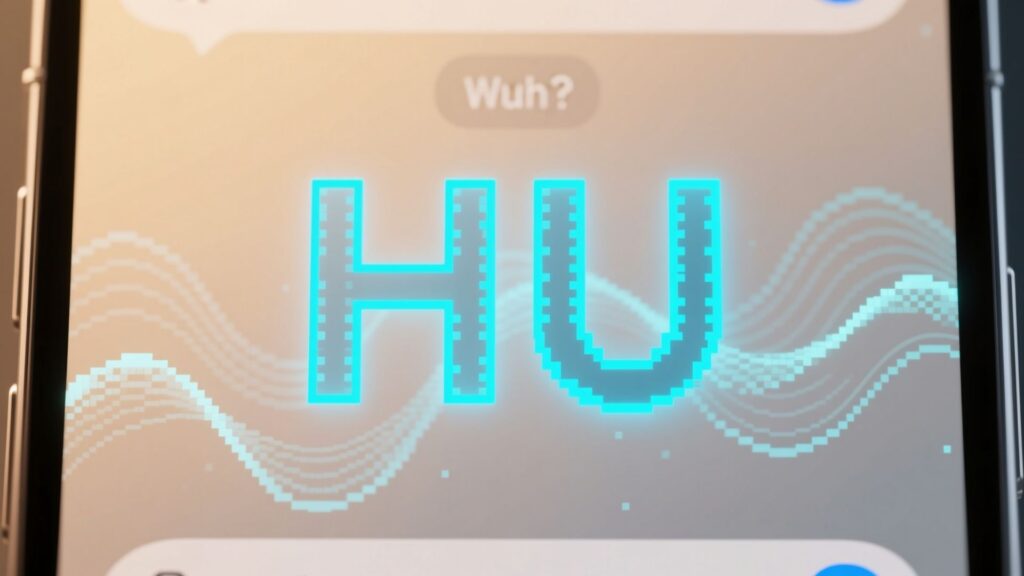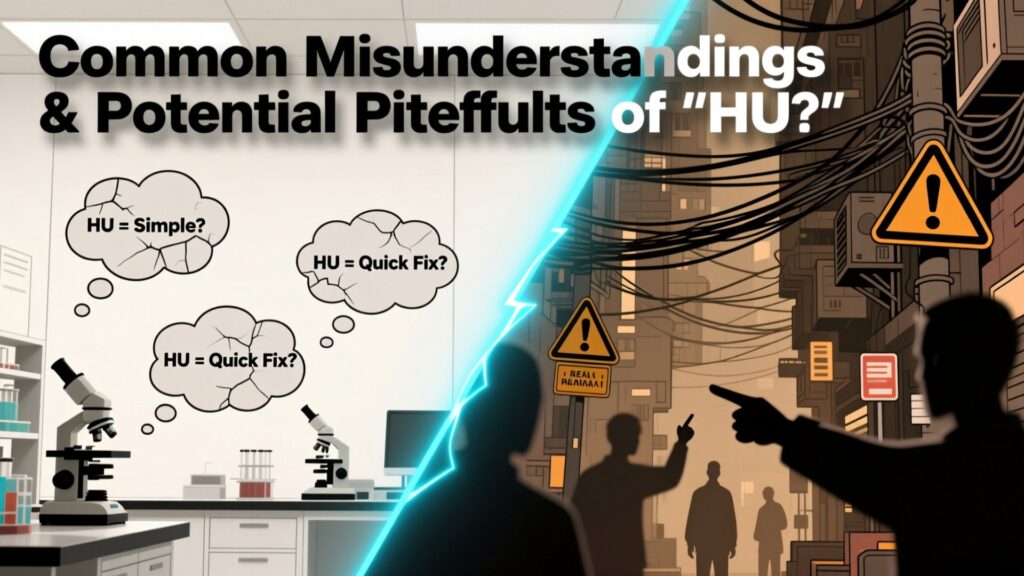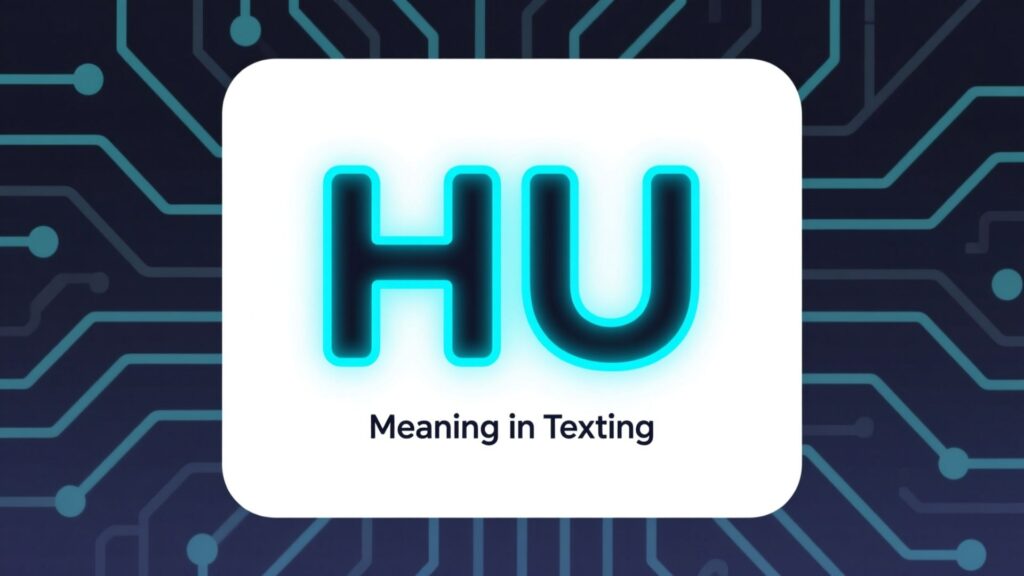You’ve probably seen “HU” pop up in chats, DMs on Snapchat or texts and wondered: what does HU mean in text? Or maybe: what does HU mean on Snapchat? In this deep-dive article you’ll learn everything from its most common meanings, to when it’s appropriate (or not), to better phrases you might use instead.
What “HU” Means: Core Definition and Variations

At its simplest, HU is an abbreviation in texting and online messaging. But it doesn’t always mean the exact same thing. Understanding each variation will help you use (or decode) it confidently.
Primary Meaning: “Hit Up”
One of the most frequent interpretations is HU = “hit up”, meaning contact or message someone. Example:
“HU me when you’re done with work.”
Here it means: “Hit me up when you’re done.”
In a 2025 context, this version is very common in casual chats.
Secondary Meaning: “Hook Up”
Another interpretation: HU = “hook up” which can imply meeting socially, hooking up for fun, or a romantic/physical connection. For instance:
“Do you want to HU tonight?”
Here it may mean: “Hook up tonight.”
Additional Meanings: Context-Dependent
HU also carries other less common meanings depending on region, age group or platform:
| Meaning | Full Form | Typical Use | Notes |
|---|---|---|---|
| “Heads Up” | Heads Up | Giving someone a warning | Can be used in chat or email texts |
| “Hey You” | Hey You | Casual greeting | Less common but still used |
| “Hold Up” | Hold Up | Asking someone to wait | Informal, rare in mainstream texting |
Summary
So when you ask what does HU mean in text? The most reliable meaning is “hit up” (contact me) in casual chats, but always check context because “hook up” or other slang versions might apply.
HU in Action: Real-World Texting Examples
Seeing how HU shows up in actual messages helps cement your understanding. Here are some realistic scenarios.
- Friend to friend: “HU me when you’re done I’ll chill at your place.” → “Hit me up…”
- Dating app chat: “Not sure what you’re into… want to HU this weekend?” → Could imply meeting socially or “hooking up.”
- On Snapchat story: “Bored. HU.” → Casual invitation to contact or meet.
- Group chat: “Anyone free Friday? HU and we’ll plan something.” → “Hit up” style.
- Mis-reading risk: “HU?” → Could be “Hey you?” or simply “HU?” for attention.
Where and When Is “HU” Commonly Used?
Understanding the platforms and audiences where HU appears helps you know when it’s appropriate.
Platforms & Users
- Social messaging apps (Snapchat, Instagram, WhatsApp) among teens and young adults.
- Informal group chats or direct messages with friends.
- Less common in formal email, business chat or among older audiences who may not know the slang.
Why It Works
- It’s short, fits easily into rapid texting.
- Signals familiarity or casual tone rather than formality.
- Reflects digital-native style of communication.
Platform Comparison
| Platform | Likelihood of “HU” Use | Notes |
|---|---|---|
| Snapchat / Stories | High | Very casual, friendly tone |
| Instagram DMs | Medium | Might appear alongside emojis |
| WhatsApp (friends) | Medium-High | Among younger users especially |
| Professional Chat | Low | Unlikely, might be misunderstood |
Is “HU” Considered Polite or Professional?
Short answer: Not really, unless you’re talking to someone who understands the slang and your context clearly allows it.
Tone and Audience Matter
- With friends: “HU me later” is fine, friendly, casual.
- With colleagues, clients or unfamiliar contacts: It can appear vague, unprofessional or even misunderstood.
- In formal writing or emails: Avoid it altogether. Use full phrases.
Example Rewrites
- Casual: “HU me when you’re free.”
- More polished: “Please contact me when you’re available.”
- Professional: “Feel free to reach out to me.”
Why It Matters
Using HU in a professional context can reduce clarity, weaken your credibility, and cause confusion among those unfamiliar with the slang.
HU vs HMU: What’s the Difference?
If you’ve seen HMU (Hit Me Up) and wondered how it differs from HU, here’s a breakdown.
| Abbreviation | Full Form | Tone | Common Use |
|---|---|---|---|
| HU | Hit Up | Casual, general | “Contact me when…” |
| HMU | Hit Me Up | Casual, direct | “Contact me specifically” |
Key point: HU can sometimes be used more broadly (“hit up someone”) while HMU is more personal (“hit me up”). Both are informal. Use them among friends or in casual chat.
Top Alternatives to “HU” (With Context & Usage)
Rather than relying on HU, you can use clearer phrases especially when clarity or tone matters. Here are some good alternatives grouped by context.
Friendly / Casual Alternatives
- Hit me up “Hit me up if you’re around.”
- Ping me “Ping me when you’re free.”
- Message me “Message me later.”
- Shoot me a message “Shoot me a message when you get a chance.”
- Buzz me “Buzz me when you’re close.”
Neutral / Everyday Alternatives
- Let’s talk soon “Let’s talk soon about the plan.”
- Drop me a line “Drop me a line if you’re interested.”
- Let me know “Let me know when you’re done.”
- Connect with me “Connect with me on LinkedIn.”
- Reach out to me “Reach out to me for more info.”
Polite / Professional Alternatives
- Get in touch “Feel free to get in touch with any questions.”
- Contact me “Please contact me if needed.”
- Feel free to message me “Feel free to message me with your thoughts.”
- Please reach out “Please reach out when you’re ready.”
Why use alternatives?
They enhance clarity, demonstrate appropriate tone, and adapt to audience and context.
How to Choose the Right Phrase Instead of “HU”
Picking the right phrase isn’t just about semantics it’s about audience, tone, intent and platform. Here’s a simple guide:
Decision Factors
- Relationship: Friend vs colleague vs new contact
- Context: Casual chat vs business communication
- Purpose: Social hang-out vs formal outreach
- Platform: DM vs email vs in-person chat
Quick Decision Table
| Context | Best Phrase | Why It Works |
|---|---|---|
| Chatting casually with friend | “Ping me” or “Shoot me a message” | Friendly, informal |
| Connecting professionally | “Connect with me” or “Get in touch” | Clear, respectful, business appropriate |
| Formal email to client | “Please reach out” or “Contact me” | Polite, professional tone |
| Social media flirtation | “Slide into my DMs” | Playful, informal |
Tip: When in doubt, err on the side of clarity and tone. If you’re unsure someone understands HU or finds slang meaningful choose a more straightforward phrase.
Common Misunderstandings & Potential Pitfalls of “HU”

Even when used among friends, HU can carry risks mainly misinterpretation. Let’s explore some common issues.
Misunderstandings
- Someone might read “HU” as “Who?” if grammar/context is weak.
- HU might imply hook up when you meant hit up this can lead to awkward or unintended interpretations. For example: “Want to HU tonight?”
One person thinks “hang out” while the other interprets a more suggestive meaning. - Older audiences or non-slang-familiar users may not recognize HU and ignore the message.
Case Study
A teen texting community noted:
“Yes, it means hook-up. It varies as to what it means. To some, it means sex, but other times it just means making out.”
That highlights a real risk: ambiguous meaning among younger users and parents.
Checklist to Avoid Misuse
- Check your audience’s familiarity with slang.
- Provide clear context around HU if using it.
- Avoid HU in formal or mixed-audience groups.
- Choose a full phrase instead if clarity is essential.
Why You Should Avoid Using “HU” in Important Communications
When your message matters professional context, formal audience, first impressions you’ll benefit from steer-clear of HU. Here’s why.
Clarity over slang
Research and readability studies highlight that clear, full-word phrases improve comprehension, especially for broader audiences.
Perception and credibility
Using slang can reduce perceived professionalism. In the workplace or client interactions, you want to inspire confidence not confusion.
Searchability & SEO
For digital content and blog posts: abbreviations like HU may hamper search engine visibility and readability. Clear language wins in content.
Example Scenario
Imagine emailing a new business contact:
“HU me when you have time to discuss the proposal.”
This could appear too casual or vague. Better:
“Please contact me when you have time to discuss the proposal.”
The latter leaves no room for misinterpretation.
Best Practices for Using Informal Language in Digital Communication
Informal language definitely has its place but using it well requires a little finesse. Here are smart guidelines.
Know your audience
If you’re texting a close friend, you have more freedom. If you’re writing to a work colleague or new connection choose clarity.
Match tone with context
If it’s a relaxed group chat, slang can enhance friendliness. If it’s a professional message opt for full words.
Use emojis or tone cues when appropriate
In casual messages, an emoji or friendly punctuation can signal tone:
“HU me 😊” vs “HU me.”
Tone matters in text.
Avoid overusing slang
Too many shortcuts in one message can make it hard to follow. Balance clarity and brevity.
Make inclusive language a priority
Not everyone understands every acronym. In mixed groups, prefer full phrases so everyone’s on the same page.
Proof-read and read aloud
Even short texts deserve a quick check. Read your message: Does it sound like something you’d say face-to-face? If not revise.
The Evolution of “HU” and Modern Slang in 2025
Language never stands still especially online. Understanding how terms like HU evolve gives a bigger picture of digital communication.
How HU emerged
- Abbreviations proliferate as texting and chat apps grew.
- “Hit up” and “hook up” became common phrases, then shortened.
- Younger users turned them into “HU” for speed.
The 2020s slang environment
With Gen Z and Gen Alpha dominating social media, new acronyms rise fast. Many slang glossaries list HU alongside dozens of others.
What’s next?
- More abbreviations will become mainstream or fade quickly.
- Platforms may introduce built-in suggestions or “translate” slang for broader audiences.
- Digital literacy will include understanding slang, abbreviations, and when they’re appropriate.
Bottom line: Knowing what HU means in text today gives you a head-start but staying flexible helps you navigate tomorrow’s slang too.
Summary Table: HU Meaning, Usage & Alternatives
| Aspect | Description |
|---|---|
| Meaning | Usually “Hit Up” (contact me); sometimes “Hook Up” or others |
| Usage tone | Informal, casual |
| Common platforms | Texts, DMs, Snapchat, Instagram |
| Avoid in | Professional, formal, unfamiliar audience |
| Clear alternatives | “Message me”, “Reach out”, “Get in touch” |
Conclusion: HU Is Handy-But Use It Wisely
So you now know what does HU mean in text, what does HU mean, and even what does HU mean Snapchat. It’s a handy, casual acronym for “hit up” or sometimes “hook up.” However, like any slang, it works best when you consider your audience, tone and context.
If you’re texting a buddy go ahead and use it. If you’re emailing a client choose clarity instead. Remember: words matter. Choosing the right phrase can make you sound friendly and clear not vague or unprofessional.
Feel free to reach out if you want a list of other slang terms decoded (I’d be happy to help!).
Bugti is the founder of Quoethint.com, a hub for English language tips, writing advice, and grammar guidance. With years of experience in English studies and a passion for clear communication, Bugti created this platform to make grammar and writing easy to understand for everyone.
